Sometimes we forget, but we can also be travelers in our own countries, and it must not be undervalued.
I was actually born in the north-west of Spain, in the town of Ferrol, and lived in a tiny fisherman village next to the Cantabrian Sea. However, I moved when I was a toddler to the south-east, just the opposite corner of my country, and Cartagena is the place I consider my hometown ever since.
Before my grandma left us, we used to go to Galicia every single year, usually during the summer, but sometimes also in Easter or for the New Year celebration. When I was little, it was a thirteen-hour drive in a backseat packed with two toddlers and my annoying self, without air-conditioner. Still, those are the road trips I remember more fondly. My mom, in her infinite patience, used to come up with absurd yet sweet games to keep us busy –honestly, to keep me from tormenting my siblings. It was a long, long trip, but it all became worth it as soon as we could have the first sniff of that smell…
Having been raised in a semi-deserted region, the aroma of fresh grass and moist woods was almost foreign to me, and it was synonym to going back to my little village. Still today, when it rains in Barcelona, my mind flies to my childhood memories at my grandparents’ farm. My grandpa singing; my grandma cooking Spanish omelette and laughing; my troublemaker little cousins; the role model I found in some of my older cousins; the little goats, the horses, the big fat scary pig, the hens. Oh, the hens. I once stole a couple of eggs and took them back to Cartagena. I hid them between my teddy bears in the hope that soon I will have some pet chicks running and cheeping around my room. No need to explain the outcome of that little experiment, nor to reveal how old I actually was.
I’ve been many places, some very exotic for a Spaniard, and the excitement of going to that tiny coastal village remains unrivalled. Maybe that’s why, as a sort of clumsy homage, some years ago I designated myself the octopus queen of my Christmas at home, in Cartagena. Octopus is the most popular dish in Galicia, although I must confess I do not recall eating much of it when I went visiting my relatives. Anyway, I established the tradition, inspired by the fact that my father worked at the time for a seafood company, of making polbo á feira for all my family. And now I’m making it for you all.
Okay. I have to warn you you’re about to see some rather disturbing images. The thing is, when you first get your hands on an octopus, usually previously frozen, for the meat to be tenderized it is highly recommended that you beat it. Literally. I use a hammer:
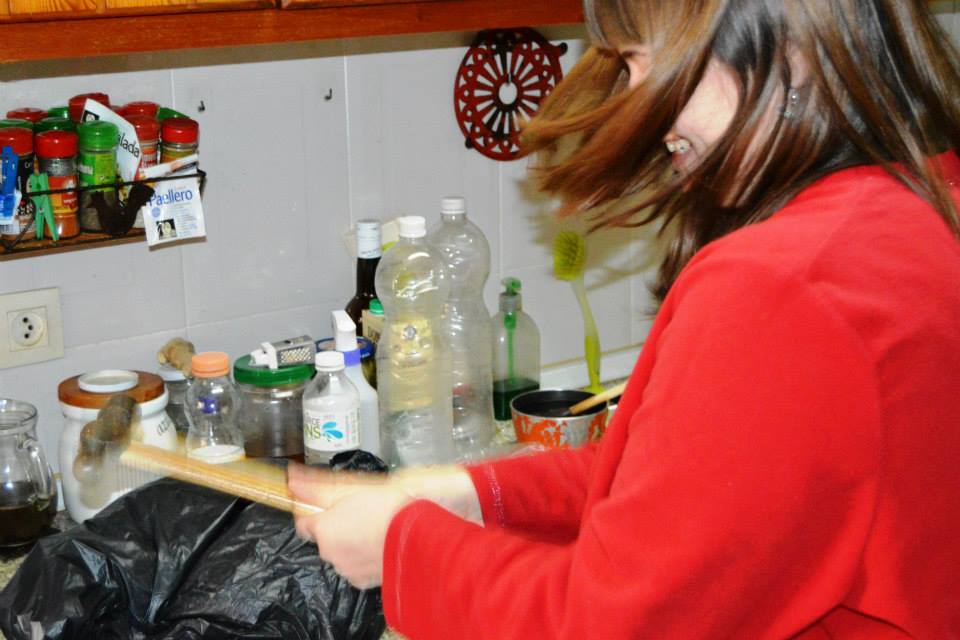
Maybe I should apologize for my messy kitchen, but in my defense I must say it was Christmas morning and my mom and I had been cooking the whole previous day and that very morning. Anyhow, I put the uncooked octopus in a plastic bag so I don’t splash with cephalopod essence and jellied purple pieces the floor, walls and cabinets (and my pretty hair, since I went to the hairdresser the day before), and started hitting it as if it were my worst enemy. Even if you gag at the thought of eating mollusks, which I don’t understand but know many people do, I highly recommend to prepare this tapa anyway: it’s the best stress reliever I have all year.
While I’m doing that, I heat a big pot of water with some salt and bayleaf. Once my octopus is defeated (or my arm, whatever happens first), I “scare” the octopus:
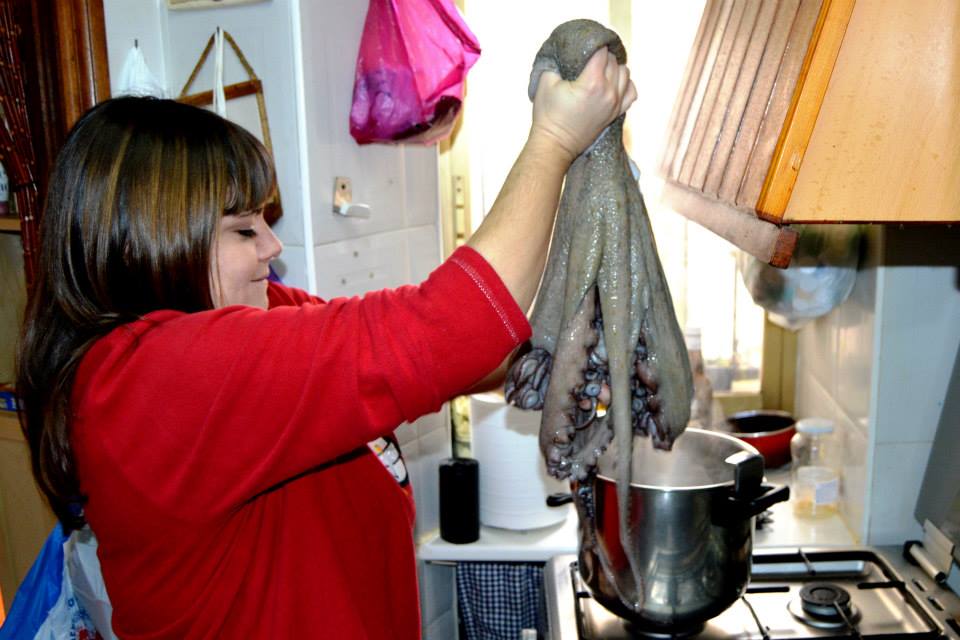
Asustar al pulpo (“scaring the octopus”) consists on holding it by the head, as shown in the picture, and dipping it at least three times in the boiling water, a couple of seconds each time. The change in temperatures allow the fibers of the tentacles to be broken (that’s why their tips curl) and therefore the meat to be even more tender.
The boiling time differs depending on the size of the octopus. If I remember correctly, this one in the picture was on the pot for about 35 or 40 minutes. I usually do not calculate it, just visit the animal from time to time and poke it with a skewer stick. If it goes right through the meat, then the dish is ready.
Next, I cut it in little pieces, pour some virgin olive oil, and sprinkle it all with smoked paprika and coarse salt. That is the Galician way of making it, although traditionally it is cooked in a copper cauldron and not in a steel pot.
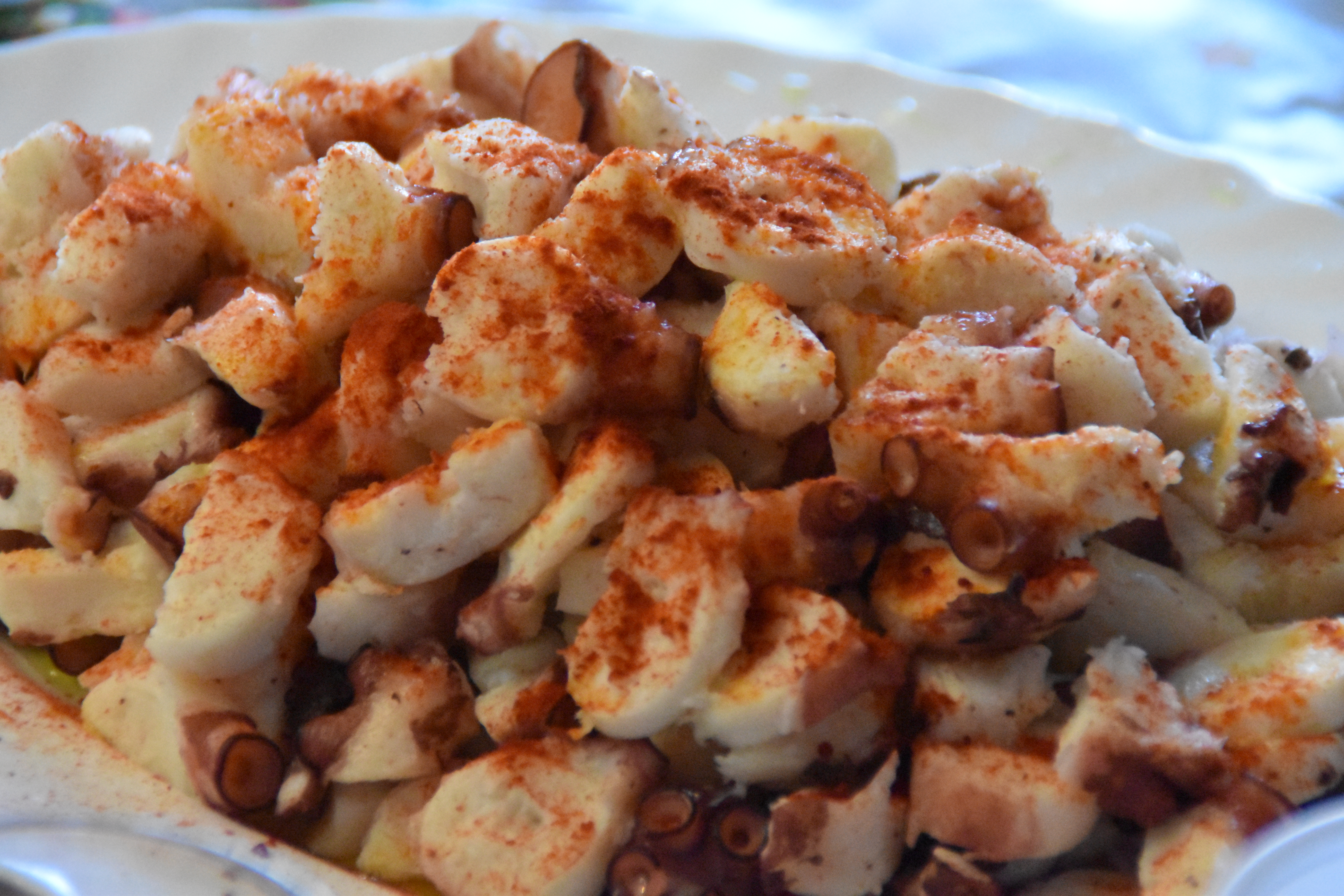
There is another octopus recipe from Murcia, the region were my hometown is located, that I also make on Christmas. Like almost everything we cook there, it is made with lemon, so instead of paprika we squeeze some lemon juice on top of it. In this case, traditionally is not boiled in a steel pot or a copper cauldron, but roasted in the oven. However, I still boil the octopus instead of oven-cook it. Since some members of my family prefer the paprika version and others the lemon version, I just make the same octopus, divide it in two platters, and then season it differently. Sometimes I’m lazy like that. In any case, nobody in my family seems to complain.
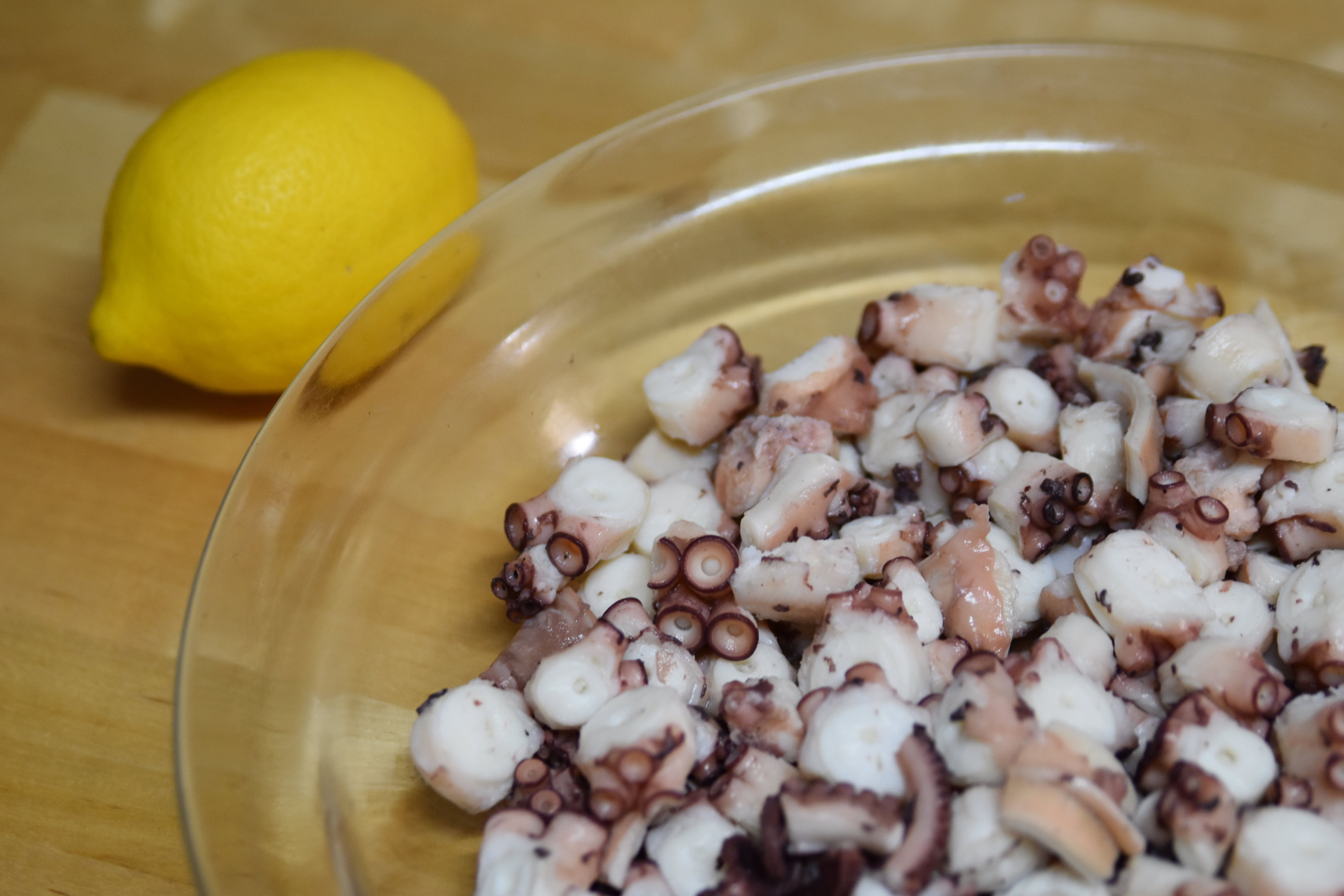
Now I have a confession to make. It is true that I treasure and cherish my same-country travels. Nevertheless, the truth is the best octopus I have ever had, was not in Galicia or in Murcia. It was in Samos, Greece. I spent part of the summer of 2016 there as a volunteer in an unaccompanied refugees children’s center, where I taught English, French, Spanish, photography, knitting and cooking. This last attempt was not very successful, maybe someday I will tell you about the inedible falafel we tried to make… Anyway, it is my understanding that, in Greece, instead of scaring it, they hang the octopus to be died in the sun after beating it. To be honest, I am not very sure; I’ve found contradictory information. Some say this is also done in Galicia, but I have only seen it in some Greek islands:
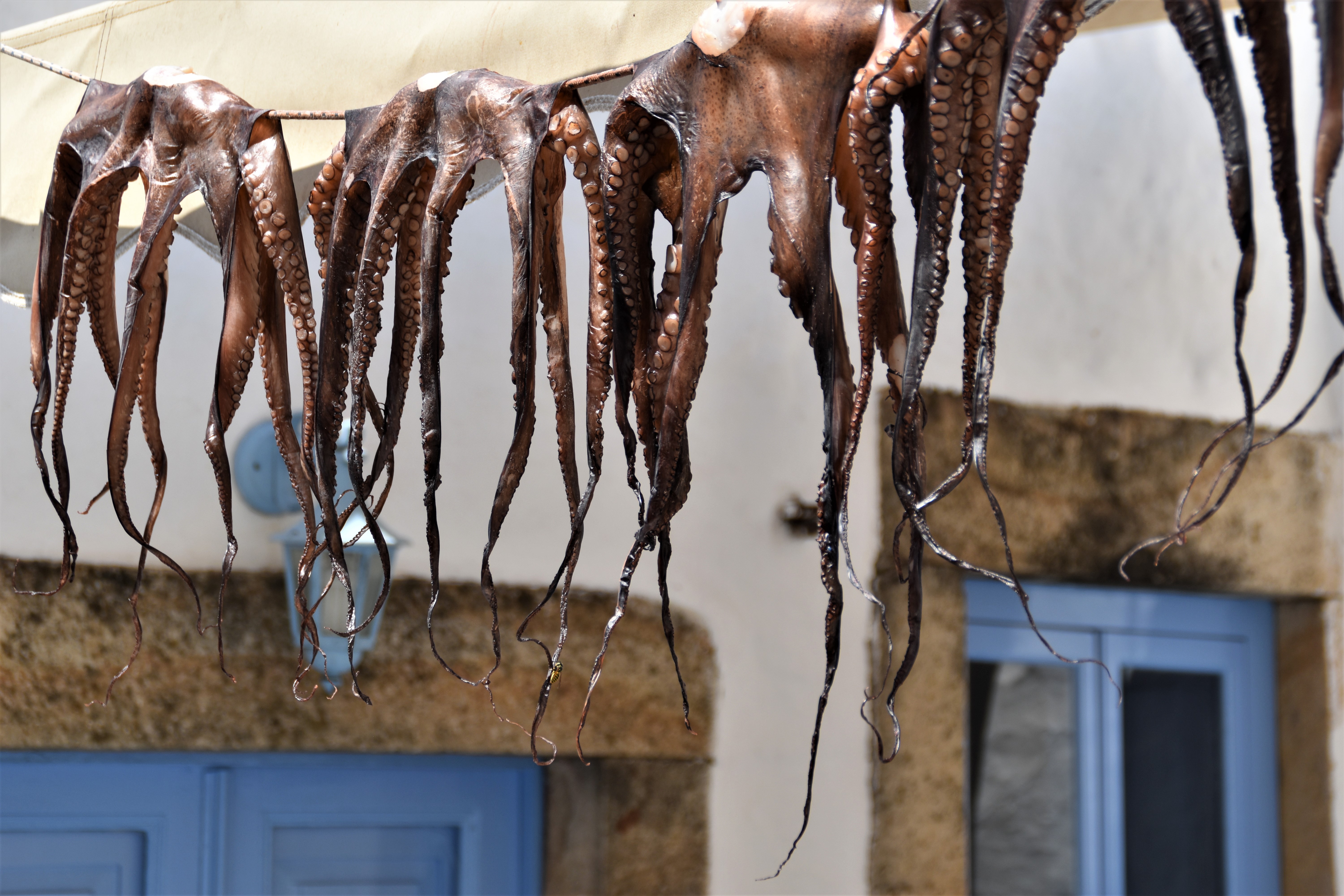
One of my last nights in Samos, I went with my fellow volunteers to the town of Pythagoreio for the festivities of the sea battle of Mikali, which consist of a symbolic fireship set alight with fireworks in the ancient harbour:

At walking distance from where we were enjoying the celebration, there was this restaurant, literally by the Aegean:
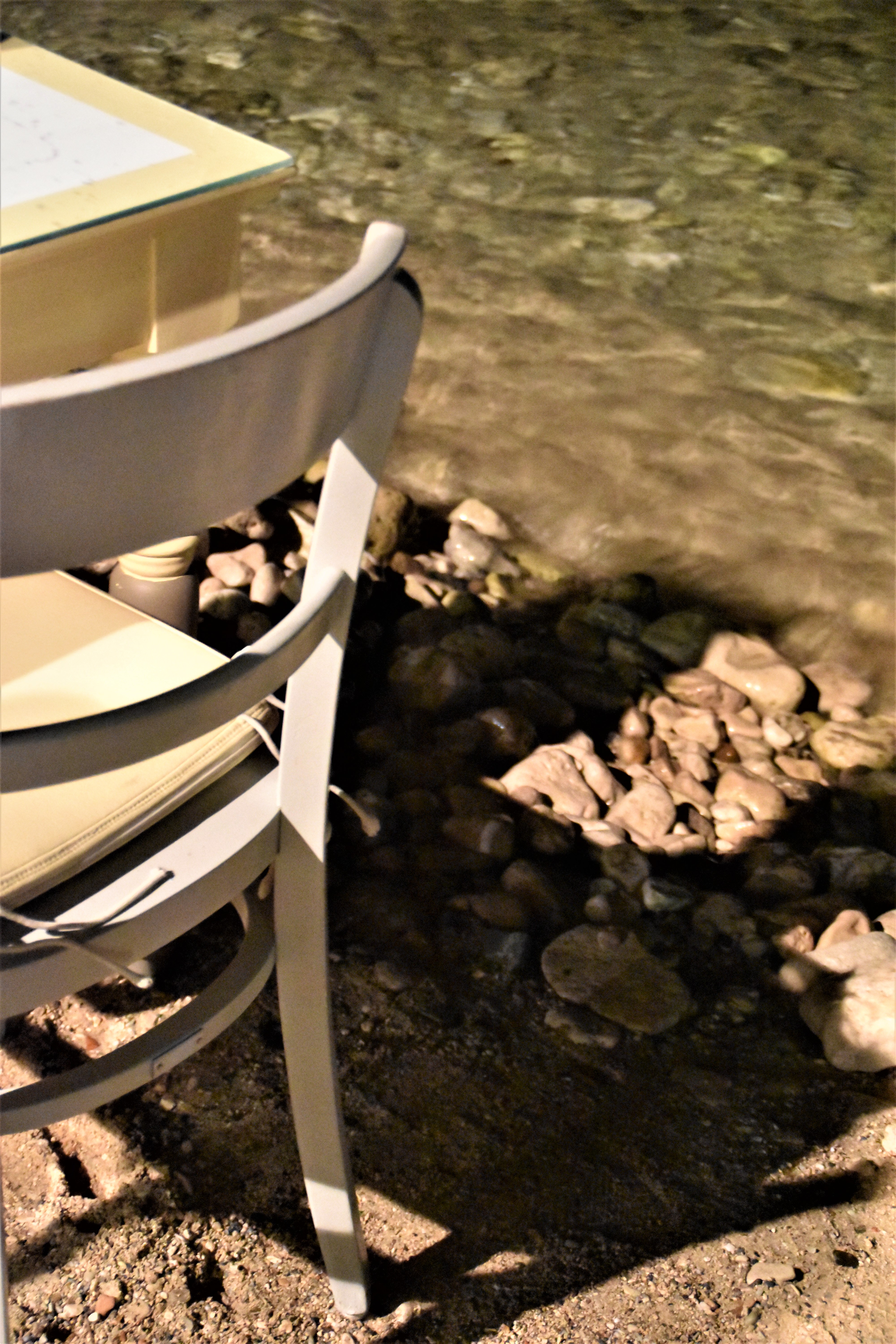
It was there I tasted the best χταπόδι of my life. It was a very simple recipe, maybe enhanced by the romantic island vibes around, but it was just grilled octopus with Mediterranean herbs. The restaurant name was Faros:
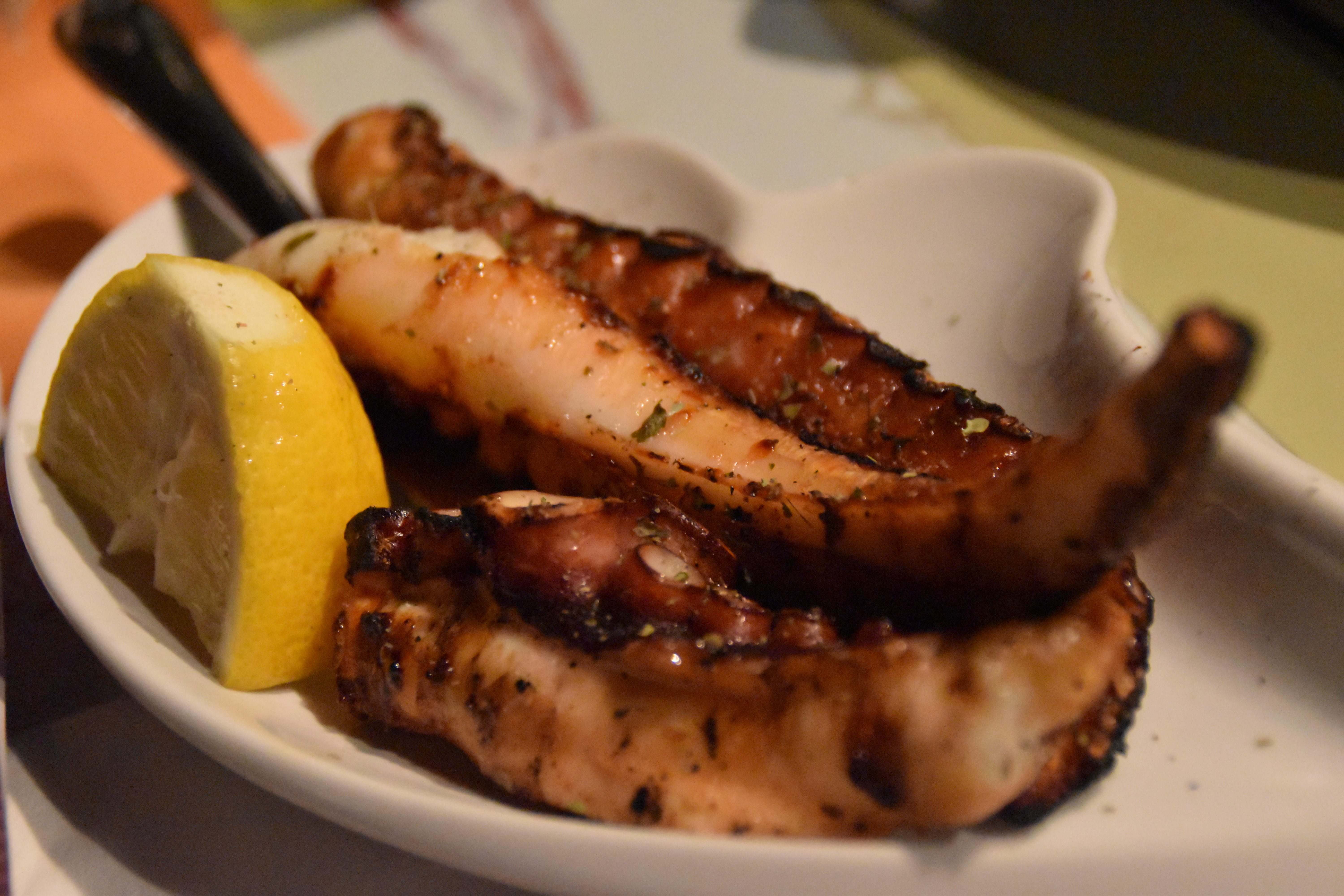
Sorry for the long post! I got a little carried away. However, do not think this concludes my octopus obsession. Someday soon, I will share with you my favorite Japanese dish, takoyaki!
Thanks for reading 🙂